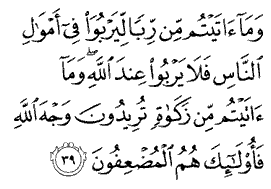Gradual Way, Changing Decree, Muslim Identity
Issue 844 » May 29, 2015 - Shaban 11, 1436
Living The Quran
Gradual Way
Al-Rum (The Romans) - Chapter 30: Verse 39
 "Whatever you give to people in usurious hope that it may return to you increased through the goods of (other) people, will bring no increase in God's sight. Whereas whatever you give in charity seeking God's 'Face' (His approval and good pleasure), for those there is increase (of recompense) multiplied."
"Whatever you give to people in usurious hope that it may return to you increased through the goods of (other) people, will bring no increase in God's sight. Whereas whatever you give in charity seeking God's 'Face' (His approval and good pleasure), for those there is increase (of recompense) multiplied."
Islam never aims to favour hypocrisy and hypocrites. So before establishing a law, first it trains and prepares hearts and minds in its favour or against it. This is why the Prophet's Companions could easily accept any commandment when it was revealed. To this end, Islam followed a gradual way in establishing its legal code. In Makkah, it prepared hearts and minds for its future injunctions. For example, throughout the Makkan verses it propounded many rules only as moral values; many of these would later become laws in Madinah. It also followed a gradual way in prohibiting such established vice as drinking alcohol and transactions involving interest.
This verse is the first to be revealed on the way to the decisive prohibition of transactions involving interest, with the aim of encouraging Muslims to avoid it. Some people would give gifts or similar things to others, particularly the merchants and money-lenders; this was not done with a pure intention, but with the hope or aim that it might come back to them, increased in value. That is, those who took these "gifts" would use them in their trade for profitable transactions, and return the "gifts" with the extra amount or value to the original owner.
Compiled From:
"The Quran: Annotated Interpretation in Modern English" - Ali Unal, p. 842
Understanding The Prophet's Life
Changing Decree
"Nothing repels the Decree except supplications and nothing increases one's lifetime except righteousness." [Tirmidhi]
All scholars recognize that nothings occurs but by the will of Allah. However, Allah is able to do everything that He wills and there is nothing constraining Him. He may even change what He has decreed from one thing to another — although all of that was within His knowledge and His preordainment. He knew that certain causes would occur. This is why one's supplications and prayers have some effect. Allah changes the decree because of one's supplications. If there were no effect to prayers and a person only received what is decreed, this would imply that Allah does not actually respond to the supplication. That conclusion contradicts what is stated in this hadith. The Messenger of Allah (peace be upon him) used to seek refuge in Allah from an evil decree. [Bukhari]
Allah erases or confirms whatever He wills of what has been decreed - although all of that is according to His pre-knowledge and what He has already recorded in the Preserved Tablet. Thus, Allah may confirm or change a person's lifespan, sustenance and so forth.
Compiled From:
"Commentary on the Forty Hadith of an-Nawawi" - Jamaal al-Din Zarabozo, p. 1434
Blindspot!
Muslim Identity
There is no true faith without understanding: for a Muslim, this means to understand both the sources (the Quran and the Sunna) and the context within which he or she is living. The responsibility of every Muslim is based on this twofold aspect of “understanding”: that is to develop, in concomitance, an “intelligence of the texts” and an “intelligence of the context” in order to find the way to remain faithful to the Islamic teachings. This has been the fundamental teaching of Islamic legal practice since the time of the Prophet, unceasingly kept up by the great scholars over the centuries. As such, Muslim identity is not closed, confined within rigid and fixed principles. On the contrary, it is based on a permanent, dynamic and dialectic movement between the sources and the environment, in order to find a way to live in harmony. This is why the development of intellectual skills is so important in Islam and, as such, partakes of the foundations of Islamic teachings. The Muslim cannot be satisfied with a hypothetical state of nature: to be a Muslim means to strive in order to increase one’s capacity, to seek tirelessly to know more, to such an extent that, in light of Islamic sources, we could state that, once the dimension of worship has been mentioned, “to be a Muslim is to learn”.
The Muslim, having to act according to the Islamic teachings, should use this capacity to make choices between what is right and what is wrong, to find the best way to please God in whatever environment he finds himself. If it is plain that there is no choice without freedom, we have yet to add that there is no choice either without knowledge and, furthermore, comprehension. Choice and ignorance are antithetical words. Therefore the elements of Muslim identity which come immediately after faith and spirituality are comprehension based on knowledge and choice relying on freedom. Together they constitute the dimension of responsibility. Muslim identity is thus defined through an active and dynamic intelligence requiring knowledge, freedom and a sense of responsibility.
Compiled From:
"To Be A European Muslim" - Tariq Ramadan